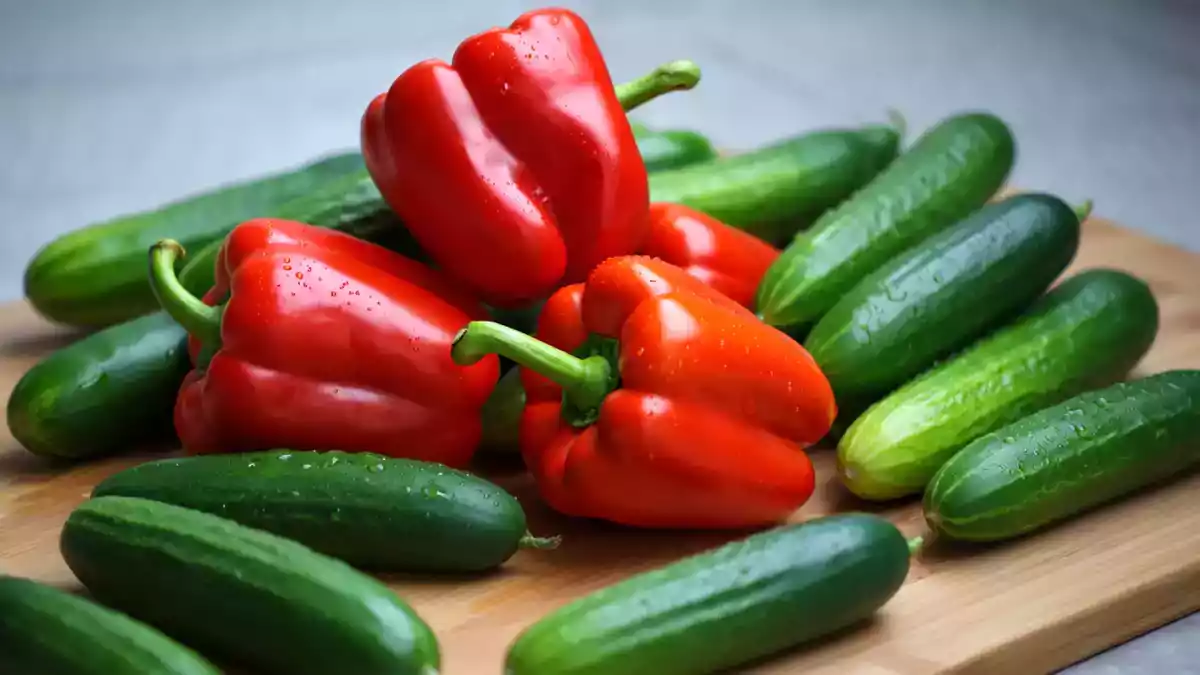Do cucumbers and peppers stick in your stomach? Here's how to digest them better

Cucumbers and peppers are among the most beloved vegetables of summer. Fresh, light, rich in vitamins and perfect for salads or healthy dishes. But if you find yourself with a bloated belly, cramps or heaviness in your stomach after eating them, you are not alone. Many people find them difficult to digest. The fiber-rich skin, seeds that ferment in the intestines or the leathery skin of peppers may be to blame. Unripe cucumbers can also contain bitter, stomach-irritating substances.
The good news is that you don't have to give up these vegetables. In this article you will discover the easiest and most practical ways to make cucumbers and peppers more digestible. If you have a sensitive stomach or suffer from intestinal discomfort, these tips will really make a difference.
1. Peel and remove the seeds: the crucial first step
One of the easiest and most effective ways to ease the digestion of cucumbers and peppers is to remove the peel and seeds. Here's why:
- The peel contains insoluble fiber that passes almost intact through the digestive tract, causing fermentation and bloating.
- The seeds can irritate the intestinal mucosa and are often difficult to digest.
Therefore, I recommend:
- Use a peeler to peel cucumbers before consuming them.
- Roast the peppers over an open flame or in the oven, then wrap them in a dish towel for a few minutes-the skin will soften and peel off easily.
- Cut the peppers in half and remove all seeds and white filaments.
2. Cooking or marinating: techniques that facilitate digestion
Although peppers and cucumbers (especially the latter) are often eaten raw, cooking or marinating them can make them much more digestible.
Why does cooking help?
Cooking softens the skin and fiber, making it easier for digestive enzymes to break them down.
- In peppers, cooking reduces the irritant capacity of the skin and seeds.
- In cucumbers, a brief marinating with vinegar or lemon helps break down the fibers and makes the taste more delicate.
How to proceed:
Peppers: try grilling, stewing, or sautéing them in a pan with a drizzle of oil. Cook them until the skin becomes soft.
Cucumbers: marinate them in apple cider vinegar or lemon juice with a pinch of salt for at least 30 minutes before eating.
3. Chew well and eat moderate portions
We often underestimate the power of chewing in the digestive process. Chewing slowly and carefully allows the enzymes in saliva to start breaking down substances, easing the work of the stomach. Also, avoiding overdoing the amounts of cucumbers and peppers in a single meal helps prevent digestive overload and intestinal fermentation.
4. Pair cucumbers and peppers with probiotic foods and digestive spices.
Combining with probiotic foods and spices can enhance digestion and reduce bloating and fermentation.
Recommended probiotic foods
- Natural yogurt or kefir
- Sauerkraut and other fermented foods
- Kombucha
These foods improve the balance of intestinal flora, which is essential for healthy digestion.
Spices that aid digestion
- Cumin
- Fennel
- Ginger
- Mint
Adding them in recipes with peppers and cucumbers helps stimulate bowel motility and reduce gas.
5. Avoid consumption on an empty stomach and with fermentable foods
Eating cucumbers or peppers on an empty stomach may accentuate the feeling of acidity or cause discomfort, especially if you have a sensitive stomach. In addition, eating them together with foods rich in fermentable carbohydrates (such as legumes or cabbage) can increase the risk of bloating and abdominal distension.
To avoid this, here is what is recommended:
- Pair these vegetables with easily digestible carbohydrates, such as rice or potatoes.
- Avoid pairing them with meals that are heavy or high in fermentable fiber.
In Brief
Digesting cucumbers and peppers without discomfort is possible through simple steps in preparation and consumption, strategies that are practical and affordable for everyone.
Incorporating these tips into your eating routine will allow you to better appreciate the fresh taste and nutritional properties of these vegetables, improving digestive well-being and the overall quality of your diet.
 Eva Alberghetti
Eva Alberghetti
Comments